Black Friday 2015 UK: Will this be the last deals day of chaos? How smart tech will turn the sales event into a great shopping experience

Last year shoppers in the UK spent £810m on Black Friday. Predictions are that the UK will see the first ever £1bn shopping day this year, when it lands on 27 November. The build-up is hugely hyped, alongside secrecy on the parts of many retailers about their killer offers.
But what about the chaos that blighted last year’s Black Friday sales? A handful of big retailers such as Asda and Primark are trying to avoid this by ‘ditching’ Black Friday this year. To some people in the retail industry, the decision signals a wider move for Black Friday from an offline to an online-only event in the UK in future years.
Read more: These apps will help you navigate Black Friday
I believe retailers are being too quick to call time on the shopping bonanza.
Smart technology is infiltrating our homes, our cars, and even our wrists, and if also used in retail, this Black Friday could be the last one of the 5am frenzy. In doing so, high street retailers can actually make more of these big shopping opportunities.
As shops become ‘smarter’, the opportunities to speed up and simplify the shopping experience proliferate.
For example, as people queue, the presence of their mobile device can trigger events in the shop’s customer service database. Analysing purchase history and preferences can inform stock layout and availability on the shop floor. The shop can also send customers directions to the most relevant parts of the shop for the offers that will interest them the most.
Read more: Black Friday deals are starting to be unveiled
These can all be supported by on-demand delivery, and “digital” changing rooms that show which accessories could go with the new winter coat you’re trying on, even advising you on how many are left in your size and where they’re located in the shop.
And possibly in the future, robotic assistants will smooth out the experience and reduce the reliance on temporary staff to cover the boom – actually helping to reduce over-crowding.
All of these options are becoming increasingly viable in the retail environment. The caveat is that if retailers are to implement them, the services and the data generated have to be quick and accurate.
The right information needs to be delivered right away to make the customer experience better. That means thinking about the support network for the shops, which will be underpinned by the right data centre solution.
Where is the data itself stored, and how easy is it to access? Is the information close enough to ensure a quick, seamless service? Considering this now, as connected solutions for retail grow roots, will help retailers cope better with future Black Friday events.